
Rice is a staple food in Nigeria, with an annual production rate of over 8 million metric tons. The production of rice, however, generates a significant amount of rice husk, which is a byproduct of the rice milling process. Rice husks or hulls are generated during the first stage of rice milling, when rough rice or paddy rice is husked.
Rice husk is the hard outer covering of the rice grain, and it is often discarded or burned, contributing to environmental pollution. It is formed from hard materials, including silica and lignin, to protect the seed during the growing season. Each kilogram of milled white rice results in roughly zero point twenty-eight (0.28) kilogram of rice husk as a by-product of rice production during milling.
However, rice husk can be utilized for various purposes, including as a fuel, animal feed, and raw material for industrial use.
In recent years, there has been a growing demand for rice husk in Nigeria, as local industries seek more sustainable and cost-effective raw materials. If you are interested in supplying rice husk to local industries in Nigeria, here are some tips to get started:
Conduct Market Research
Before starting a rice husk supply business, it is essential to conduct market research to identify potential customers and their specific requirements. You need to know which industries use rice husk, the volume they require, and the price they are willing to pay. You can conduct research by attending trade shows, talking to industry experts, and visiting potential customers to learn more about their operations and needs.
Identify Potential Sources of Rice Husk
The primary source of rice husk is rice mills. Therefore, it is essential to identify the mills in your area and the quantity of rice husk they generate. You can contact the mill owners and negotiate a deal to purchase their rice husk. Alternatively, you can partner with rice farmers and millers to obtain the rice husk.
Determine Your Supply Capacity
After identifying potential sources of rice husk, you need to determine your supply capacity. How much rice husk can you supply to customers on a regular basis? You need to have a reliable and consistent supply of rice husk to build a sustainable business. Ensure that you have the necessary resources, such as storage facilities, transportation, and labor, to handle the volume of rice husk you plan to supply.
Set a Competitive Price
To be competitive in the market, you need to set a price that is reasonable and attractive to customers. The price should cover your costs and ensure that you make a profit. You can research the market and compare prices with other rice husk suppliers to determine a fair price. It is essential to keep your pricing competitive, as customers are always looking for cost-effective raw materials.
Develop a Business Plan
To start a rice husk supply business, you need a comprehensive business plan that outlines your goals, objectives, strategies, and financial projections. A business plan will guide you through the startup process and help you secure financing, if needed. It should include your market research, supply capacity, pricing strategy, marketing plan, and financial projections.
Obtain Necessary Licenses and Permits
To operate a rice husk supply business in Nigeria, you need to obtain the necessary licenses and permits from the relevant authorities. You need to register your business with the Corporate Affairs Commission, obtain a tax identification number, and obtain any necessary permits from the local government or regulatory agencies.
Build a Reliable Network
Building a reliable network of customers, suppliers, and partners is critical to the success of your rice husk supply business. You need to establish strong relationships with your customers to ensure that they continue to buy from you. You also need to maintain good relationships with your suppliers to ensure a steady supply of rice husk.
Additionally, you can network with other businesses in the industry to share knowledge, resources, and opportunities.
Market Your Business
To attract customers and build your brand, you need to market your rice husk supply business effectively. You can use various marketing strategies, such as social media, email marketing, trade shows, and advertising, to reach potential customers.
According to a report by the Food and Agriculture Organization (FAO), Nigeria produced about one million, four hundred and fifty thousand (1,450,000) tons of rice husk in 2017, which is expected to increase with the increase in rice production.
Rice husk has several potential uses in Nigeria, including:
Biofuel Production: Rice husk can be used as a renewable source of energy to produce biofuels such as bioethanol and biogas. Bioethanol is a clean and renewable energy source that can be used as a fuel for vehicles and generators. Biogas, on the other hand, can be used for cooking and lighting.
Animal Feed: Rice husk can be used as an animal feed. It contains about fifteen to twenty percent (15-20%) of crude fiber, which is a good source of roughage for livestock. The husk can also be used as a substrate for mushroom cultivation.
Building Materials: Rice husk can be used as a raw material for the production of building materials such as particleboard, insulation board, and roofing tiles. These products are environmentally friendly and have good insulation properties.
Soil Amendment: Rice husk can be used as a soil amendment to improve soil fertility and structure. It contains about fifteen to twenty percent (15-20%) silica, which can help to reduce soil acidity and improve water retention.
Rice husk is an important industrial raw material and there is large, growing and sustainable market for the product. Supplying rice husk to local industries in Nigeria is a very lucrative business that would generate a lot of revenue for the investors.






















